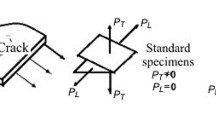The paper presents results of experimental investigations to assess the effect of Mode I and II thermomechanical pre-loading on the crack resistance of specimens in four-point bending tests. Specimens were subjected to Mode I and II repeated loading. The investigations were carried out on heat-resistant reactor steels. An algorithm for the numerical assessment of fracture toughness with allowance for thermomechanical pre-loading under mixed loading conditions is proposed.








Similar content being viewed by others

References
V. V. Pokrovsky, V. T. Troshchenko, G. A. Kopcmsky, et al., “The influence of plastic prestraining on brittle fracture resistance of metallic materials with cracks,” Fatigue Fract. Eng. Mater. Struct., 18, No. 6, 731–746 (1995).
V. V. Pokrovsky, V. T. Troshchenko, V. G. Kaplunenko, et al., “A promising method for enhancing resistance of pressure vessels to brittle fracture,” Int. J. Press. Vess. Piping, 58, 9–24 (1994).
B. T. Timofeev and V. I. Smirnov, “Calculated and experimental estimation of preliminary loading effect at elevated temperatures on fracture toughness of pressure vessel materials,” Int. J. Press. Vess. Piping, 63, 135–140 (1995).
G. G. Chell, J. R. Haigh, and V. A. Vitek, “A theory of warm pre-stressing: experimental validation and the implication for elastic-plastic failure criteria,” Int. J. Fract., 17, No. 1, 61–82 (1981).
D. J. Smith, S. Hadidimoud, and H. Fowler, “The effects of warm pre-stressing on cleavage fracture. Part 1: Evaluation of experiments,” Eng. Fract. Mech., 71, 2015–2032 (2004).
T. D. Swankie and D. J. Smith, “Low temperature mixed mode fracture of a pressure vessel steel subject to prior loading,” Eng. Fract. Mech., 61, 387–405 (1998).
M. R. Ayatollahi and M. Mostafavi, “Finite element analysis of a center crack specimen warm pre-stressed under different modes of loading,” Comput. Mater. Sci., 38, 847–856 (2007).
V. V. Pokrovsky and V. G. Sydiachenko, “Prediction of influence of warm prestressing on the fracture toughness of heat resistant steels under mixed mode deformation,” in: Proc. of Int. Conf. “Strength of Materials and Structural Elements” [in Russian], Vol. 2, Kiev (2010), pp. 52–53.
V. V. Pokrovskii, V. N. Ezhov, V. G. Sidyachenko, and Yu. I. Koval’, “A study of the laws governing the development of cracks under mixed loading modes,” in: Proc. of the 13th Int. Colloq. “Mechanical Fatigue of Metals” [in Russian], Ternopol (2006), pp. 259–265.
V. G. Sidyachenko, “A procedure for the investigation of the crack resistance of reactor steels under mixed I+II loading modes,” Vest. KPI, Ser. Mashinostroenie, Issue 63, 83–86 (2011).
V. V. Pokrovskii and V. G. Sidyachenko, “Prediction of the effect of thermomechanical pre-loading on the fracture toughness of heat-resistant vessel steels with mixed schemes of deformation,” in: Proc. of Int. Conf. “Strength of Materials and Structural Elements” [in Russian], Kiev (2011), pp. 340–347.
P. V. Yasnii, I. B. Okipnyi, and Yu. I. Pyndus, “Assessment of brittle strength of nuclear reactor pressure vessel steel upon warm prestressing,” Strength Mater., 42, No. 1, 32–37 (2010).
V. V. Pokrovskii and A. G. Ivanchenko, “Influence of the modes of thermomechanical preloading on the resistance of heat-resistant steels to brittle fracture,” Strength Mater., 31, No. 2, 200–209 (1999).
Ya. L. Ivanitskii, Methods for the Assessment of the Crack Resistance of Structural Materials under Combined Loading Conditions [in Russian], Author’s Abstract of the Doctor Degree Thesis (Tech. Sci.), Lvov (2005).
A. Laukkanen, “Ductile elastic-plastic mixed mode I–II crack propagation mechanisms and fracture resistance in metallic materials,” in: Proc. of ECF12, Fracture from Defects, Sheffield, UK (1998), pp. 667– 672.
A. Laukkanen, K. Wallin, and R. Rintamaa, “Evaluation of the effects of mixed mode I–II loading on elastic-plastic ductile fracture of metallic materials,” in: Mixed Mode Crack Behavior, ASTM STP 1359 (1999), pp. 3–20.
G. S. Pisarenko and A. J. Krasowsky, “Analysis of kinetics of quasibrittle fracture of crystalline materials,” in: Proc. of Int. Conf. on Mechanical Behavior of Materials, Vol. 1, Kyoto (1972), pp. 421–432.
R. O. Ritchie, J. F. Knott, and J. R. Rice, “On the relationship between critical tensile stress and fracture toughness in mild steel,” J. Mech. Phys. Solids, 21, No. 6, 395–410 (1973).
Author information
Authors and Affiliations
Additional information
Translated from Problemy Prochnosti, No. 1, pp. 80 – 90, January – February, 2013.
Rights and permissions
About this article
Cite this article
Pokrovskii, V.V., Sidyachenko, V.G. Effect of mode I and II thermomechanical pre-loading on the fracture toughness of heat-resistant vessel steels. Strength Mater 45, 56–63 (2013). https://doi.org/10.1007/s11223-013-9432-7
Received:
Published:
Issue Date:
DOI: https://doi.org/10.1007/s11223-013-9432-7



